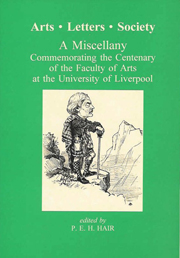 Arts - Letters - Society
Arts - Letters - Society Book contents
- Frontmatter
- Contents
- Introduction
- Preface
- PART 1 I REMEMBER ..
- PART 2 ESSAYS INFORMATIVE AND CRITICAL
- The Claims of the Arts Faculty
- The Buildings of the Faculty of Arts
- How a Redbrick Arts Faculty Worked
- The Humanities in a Technological Age
- The Real Mackay
- The Once and Future Faculty
- APPENDIX
- List of Illustrations
- Index
- Plate section
The Humanities in a Technological Age
from PART 2 - ESSAYS INFORMATIVE AND CRITICAL
- Frontmatter
- Contents
- Introduction
- Preface
- PART 1 I REMEMBER ..
- PART 2 ESSAYS INFORMATIVE AND CRITICAL
- The Claims of the Arts Faculty
- The Buildings of the Faculty of Arts
- How a Redbrick Arts Faculty Worked
- The Humanities in a Technological Age
- The Real Mackay
- The Once and Future Faculty
- APPENDIX
- List of Illustrations
- Index
- Plate section
Summary
When I was Dean I was instructed to write to all the Heads of Department in the Arts Faculty to ask how they would justify their existence in an age of technology. At the time the Faculty included subjects which afterwards set up a separate faculty of Social and Environmental Studies – Architecture, Psychology, Geography, Politics, etc – all of which were welcoming to the age of technology. I was much more worried by some of the arguments used by other respondents, who spoke condescendingly of science, although it shared many of the values the Arts men took for granted. I myself had been offered a free medical education by a London hospital on the strength of my examination results at the age of sixteen; I came from four generations of doctors and derived my love of Shakespeare and the King James version of the Bible from my father. I could not, therefore, believe that medicals and other scientists were Barbarians and Philistines (to use Matthew Arnold's labels).
I determined to set the record straight by writing a pamphlet - A Courteous Caveat, or A Short View of the Faculty of Arts in a Technological Age, by Jeremy Longstaffe, Gent - intended to be published while I was still Dean. It contained numerous misleading clues in order to throw readers off the scent. There were two main reasons why I withdrew the pamphlet: its authorship was suspected by a member of the Press committee, and several colleagues to whom I showed the typescript, including Thomas Kelly, were convinced that my views and those of Longstaffe were identical. The pamphlet consisted of the views expressed to me by the departmental heads, together with some criticisms of their attitudes, and it ended with a ‘Dialogue on Reform’.
- Type
- Chapter
- Information
- Arts - Letters - SocietyA Miscellany Commemorating the Centenary of the Faculty of Arts at the University of Liverpool, pp. 167 - 182Publisher: Liverpool University PressPrint publication year: 1996


